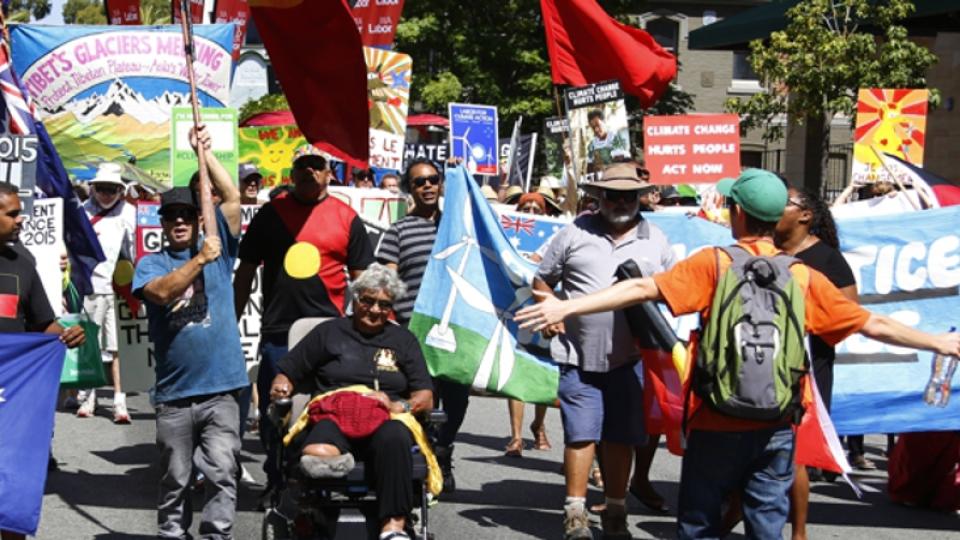Socialists welcome Green New Deal motion passed in Victorian parliament

The passing of the Greens-initiated motion for a Green New Deal (GND) in Victoria in the Legislative Council on November 11 is a significant step forward.
It is the first time that an Australian parliament has supported a plan to create jobs and address urgent social needs while responding to the climate emergency.
While it is not binding on the Daniel Andrews Labor government, the motion passed with Labor’s support in the upper house. The Labor majority Legislative Assembly should also endorse this GND motion and move swiftly to turn it into action.
The motion passed by Legislative Council MPs called on the government to use the upcoming state budget as a once-in-a-generation opportunity to implement a GND by investing in:
• A big build of publicly-owned renewable energy and storage projects, with a transition plan for coal workers;
• A big build of new public housing;
• Employing more educators, healthcare workers and social support workers;
• Large-scale projects to regenerate bushfire-affected areas and protect threatened species;
• Bike lanes and other active transport projects;
• Projects to revive our main shopping strips; and
• Building recycling plants.
The Labor MLCs who supported the motion say that the government is already working on projects that fulfil each of the seven parts of the motion. Because the motion was fairly general, Labor hopes to be able to get away with this happy-sounding motion.
On November 15, just four days after the GND motion was passed, the government announced it would spend $5.3 billion on building more than 12,000 “social housing dwellings”.
While a big investment in housing for people on low incomes is welcome, looking at the detail it appears that little or none of the funds are being deployed for new public housing.
It appears that most funding will go to community housing associations, which have been the main vehicle for public housing being privatised.
While community housing association housing is better than the private rental market, their tenants pay higher rent and do not have the same rights as public housing tenants. They also house very few homeless people or people receiving JobSeeker or Youth Allowance.
Victoria urgently needs to build at least 100,000 new, ecologically sustainable and good quality public housing units. Such a program would not only address an urgent need — there is a huge wait list — it would also create jobs while reducing greenhouse gas emissions.
The poor design of most Australian homes contributes up to 20% of all greenhouse gas emissions.
Properly done, such a program can also rescue public housing from its present status as low quality, poorly maintained “welfare housing”.
The government also needs to kick start a public works program to convert the state’s manufacturing industry into building more electric buses, trains, trams, wind turbines and components for ecologically-sustainable homes.
There is no time to wait for the private sector to do this. In addition, studies show that more jobs would be created through direct public investment than giving incentives to big business.
The Victorian Greens should be congratulated for the GND initiative. But, to make it more than a happy parliamentary motion, we need a broad, street-based mass movement to force the government to turn it into practical job-building measures and effective social and ecological programs.
For this GND to be realised, unions need to help create an independent mass movement.
Recent studies by the Grattan Institute and The Australia Institute show the federal government’s “gas-led recovery” plan — which is being supported by the Labor Opposition — is a fraud: it will not create many jobs; it will not deliver lower energy bills to households; and it will be very bad for the environment.
Electrical Trades Union (ETU) national secretary Allen Hicks has taken a strong position in favour of his members’ jobs and the necessary transition. In a letter to Labor leader Anthony Albanese on November 16, Hicks said the federal government needed to have a strong emissions reduction target for 2030 and appealed to Labor’s Shadow Cabinet not to sign up to “Coalition slogans”.
Hicks said that his members view the current debate, which is being framed around being “for coal” or “against coal”, as a “self-indulgent diversion from the fact that they are losing their traditional stable and secure jobs at an ever increasing pace right now”.
Talking about the transition like it is some kind of conceptual future possibility is unhelpful, he said.
The ETU represents more than 60,000 energy industry workers and Hicks said they “didn’t need false hope”.
“We know, given that renewables are so much cheaper, that the projected life of some of the coal-fired power stations is going to be at risk, so this is urgent.” He said the Labor Party needed to “stop the distraction of arguing the merits or otherwise of fossil fuels” and formulate a coherent energy policy to take to the next election. “What I’m saying is the Labor party knows, and they’ve got the facts in front of them, about renewables and the opportunities they can create — they have to be bold.”
Fossil-fuel workers need to be supported through the transition away from coal and gas with dignity. Publicly-owned renewable energy and storage projects, with a transition plan for affected workers, would do this.
[Sue Bolton is a member of the Socialist Alliance national executive and a Moreland councillor.]